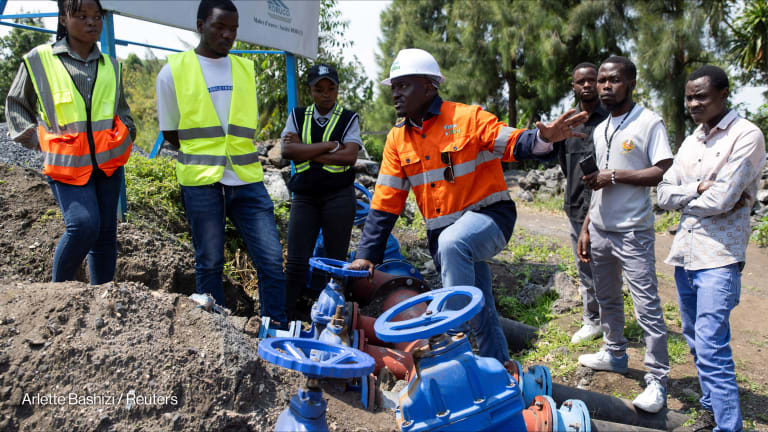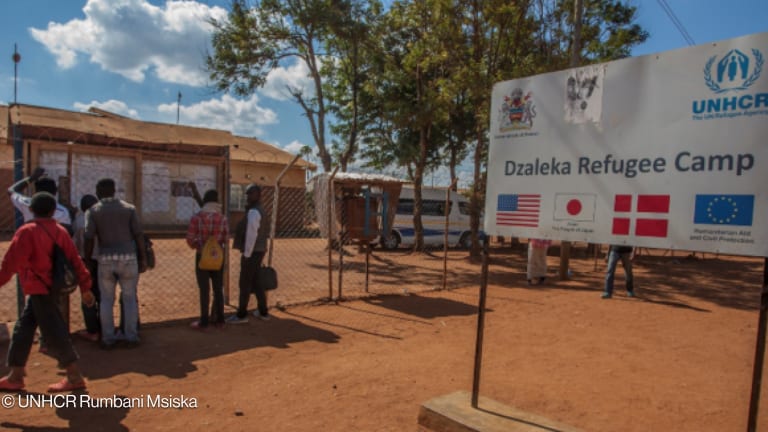USAID-Malawi Partnership
The overarching goal of U.S. assistance to Malawi through 2018 is to reduce poverty and promote socio-economic development. As in previous years, health is the priority sector for fiscal 2015.
Family in Malawi. Health remains a priority sector in Malawi, accounting for 77.2 percent of the U.S. budget request for the country for fiscal 2015. Photo by: B. Deutsch / USAID Exhibiting some of the worst development indicators in the world, Malawi suffers from widespread poverty, a fragile economy and dire social conditions. Agriculture accounts for 38 percent of the landlocked country’s gross domestic product. It is also the largest source of employment for Malawians, most of whom earn a living through maize farming. As such, the economy is highly vulnerable to environmental shocks such as periodic droughts. But a lack of skilled workers, corruption, and gaps in road, water and communications infrastructure make it difficult for Malawi to diversify its economy. In the health sector, HIV and AIDS continue to be a major concern. While the incidence rate has declined from 12 percent in 2004 to 10.6 percent in 2010, prevalence among urban women remains at 22.7 percent. Its social impact is immense: more than half of Malawi’s 1 million orphans lost their parents to complications related to HIV and AIDS. One-third of hospital visits are due to malaria, with an estimated 6 million cases per year. Meanwhile, water-borne diseases continue to plague areas that have limited or no access to clean water, accounting for more than 50 percent of illnesses in rural Malawi. And despite having an agriculture-based economy, the government estimates that 13 percent of the population requires food aid. Climate change, natural disasters and massive deforestation — the most widespread in the Southern African Development Community — contribute to food insecurity in Malawi. Further, in early 2013, Malawians went on strike to protest low wages and the relatively high cost of living. The U.S. Agency for International Development, one of the top donors to the country, recognizes the need to improve Malawi’s socio-economic situation and catalyze much-needed development. Funding levels The United States has provided $703 million in base appropriations to Malawi from 2010 to 2013, and has requested $166.4 million and $186.1 million for fiscal 2014 and 2015, respectively. The majority of U.S. funding to Malawi is coursed through USAID, but assistance is also channeled through the Health and Human Services Department, Department of Agriculture, the Peace Corps, the Department of State, the Millennium Challenge Corp., Department of Defense and the U.S. African Development Foundation. Funding priorities USAID engagement in Malawi consists mostly of interventions to improve social development and strengthen the health sector. The graphic below details USAID’s most recent sector allocations. U.S. requested funding for Malawi for FY 2015, broken down by sector. Click here to view a larger version. USAID interventions for social development include: - Funding for basic education ($9 million) to improve the quality of primary school education and the teaching methods of instructors. - Funding to support the implementation of the government’s food security strategy ($17 million) as part of the Feed the Future program. - Funding to support the implementation of climate change adaptation activities and to improve environmental sustainability ($8 million) under the Global Climate Change Initiative. - Actions to reduce chronic malnutrition particularly among children under 5 years of age and pregnant women. - Actions to strengthen agricultural trade, including setting up of warehouses for storage of commodities and training farmers to combat post-harvest losses. - Capacity building and institutional development for civil society organizations. In support of the Global Health Initiative, USAID interventions in the health sector include: - Increasing access to family planning services and information especially in rural communities and areas with limited access. - Improving the quality of maternal and child care services in order to reduce maternal and neonatal morbidity and mortality. - Support to interventions in agriculture to improve nutrition among the Malawian population in conjunction with the Feed the Future program. - Support for integrated HIV and AIDS prevention, care and treatment programs, and vulnerable members of the population particularly the youth ($15.5 million) in conjunction with the President’s Emergency Plan for AIDS Relief. - Support for enhanced prevention and treatment of malaria ($24 million) under the President’s Malaria Initiative. - Assistance to the National Tuberculosis Control Program to improve tuberculosis detection and treatment ($1.5 million). - Mitigating incidences of water-borne diseases, increasing access to safe water and sanitation services, and promoting better hygiene practices. In the energy sector, USAID’s Global Climate Change Enhancing Capacity for Low Emissions Development Strategies program will support MCC initiatives by undertaking activities to develop renewable energy sources in the country. Devex analysis The development community exhibited renewed interest in Malawi after Joyce Banda won the presidential elections in 2012. By quickly pursuing reforms in both the economic sector and the government, the president regained the trust of top development partners such as the International Monetary Fund and MCC, which had suspended aid to the southern African country. Recent OECD data places the United States as the top donor to Malawi, followed by the United Kingdom and the World Bank’s International Development Association. USAID’s current development cooperation strategy with Malawi followed a $700 million partnership engagement that ended in 2013. Additionally, Malawi is party to a five-year compact with MCC. The $350.7 million partnership, which will be carried out until 2018, will fund investments in the energy sector, particularly in power generation, transmission, distribution and policy reform. It will also provide support to watershed management for Malawi’s hydroelectric facilities. Through a renewed partnership with Malawi extending through 2018, USAID is poised to provide continued support to the country for the foreseeable future. Contact USAID Tel: (1-202) 712-5489 Email:
Family in Malawi. Health remains a priority sector in Malawi, accounting for 77.2 percent of the U.S. budget request for the country for fiscal 2015. Photo by: B. Deutsch / USAID
Exhibiting some of the worst development indicators in the world, Malawi suffers from widespread poverty, a fragile economy and dire social conditions.
Agriculture accounts for 38 percent of the landlocked country’s gross domestic product. It is also the largest source of employment for Malawians, most of whom earn a living through maize farming. As such, the economy is highly vulnerable to environmental shocks such as periodic droughts.
This story is forDevex Promembers
Unlock this story now with a 15-day free trial of Devex Pro.
With a Devex Pro subscription you'll get access to deeper analysis and exclusive insights from our reporters and analysts.
Start my free trialRequest a group subscription Printing articles to share with others is a breach of our terms and conditions and copyright policy. Please use the sharing options on the left side of the article. Devex Pro members may share up to 10 articles per month using the Pro share tool ( ).
As former Devex editor for business insight, Aimee created and managed multimedia content and cutting-edge analysis for executives in international development.








